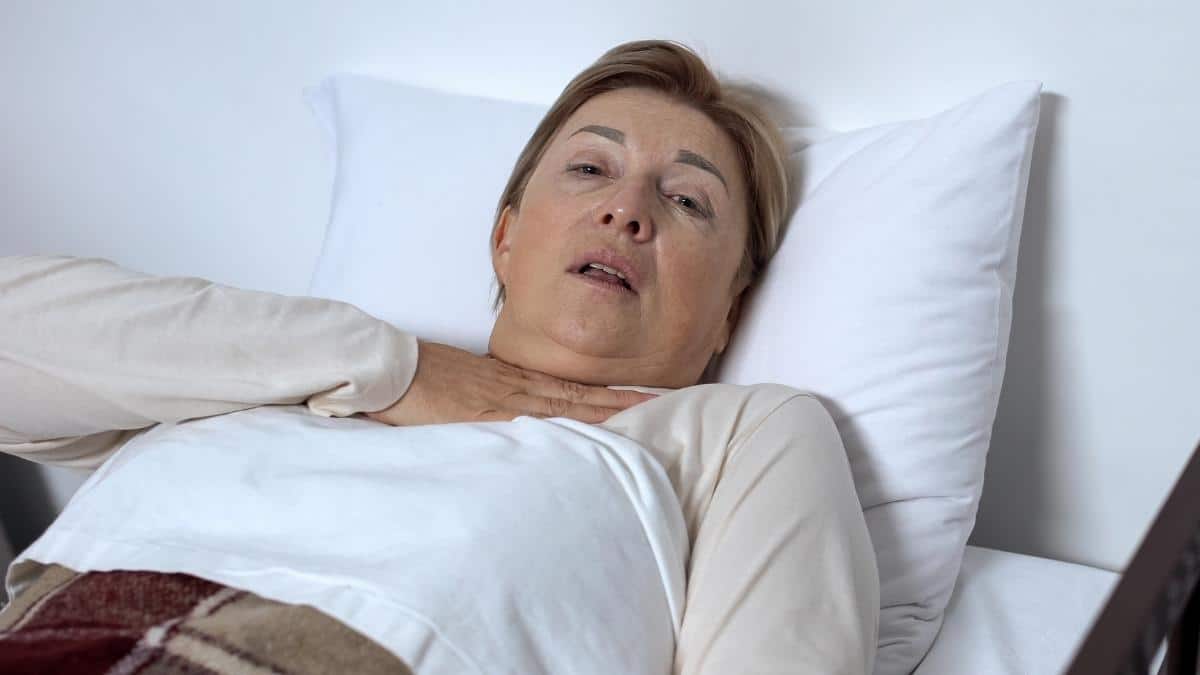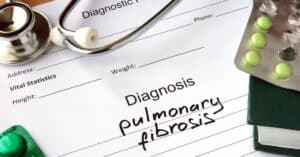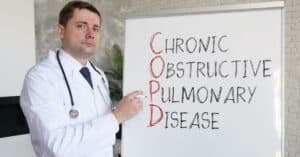COPD, or chronic obstructive pulmonary disease, is an umbrella term for various conditions that affect the lungs and breathing. Many things can exacerbate COPD, bringing about an array of challenging symptoms.
It’s essential you know what to do during a COPD exacerbation. In addition, understanding what to do can greatly help in the event of an emergency.
COPD can be difficult to manage, but there are steps you can take daily to prevent exacerbations and make life with COPD much easier, and even extend your life expectancy.
COPD Exacerbation Causes
A COPD exacerbation occurs when the lungs become inflamed. Bacteria, other organisms, or viruses are often the cause of inflammation.
Inflammation causes the airways of the lungs to narrow and become blocked. This blockage happens because of the production of mucus and swelling in the lungs.
Exacerbations can also happen due to allergies or environmental substances that irritate, such as pollution. Smoking cigarettes can also trigger an exacerbation.
Some other causes of a COPD exacerbation include:
- Anxiety or stress
- Changes in the weather
- Pneumonia
- Sleep deprivation
- Constant physical exertion
It’s important to know that doctors aren’t always able to pinpoint the cause of COPD exacerbations. Furthermore, the frequency in which a patient has COPD exacerbations differs per person, but studies show that some individuals are likely to experience more than one every year.
These include:
- Those who experience a decrease in lung function
- People who produce mucus when coughing frequently
- Females
- Anyone who had exacerbations the year prior
- Older adults
Signs and Symptoms of COPD Exacerbation
There are several signs and symptoms you may experience if you’re going through an exacerbation. It’s also important to understand that exacerbations aren’t the same for everyone with COPD. You may experience different symptoms compared to another person.
To combat symptoms and the potential problems that an exacerbation can bring, it’s critical to have a plan in place.
Signs and symptoms of COPD exacerbation include:
- Swelling in your ankles or legs
- Changes in your mucous such as thickness or color
- Gasping for air
- Lack of oxygen
- Fatigue for longer than a day
- Increased coughing
- Trouble sleeping
All of these symptoms indicate that you should give your doctor a call. However, you should call 911 if you’re experiencing the following:
- Disorientation
- Blue fingers and lips
- Trouble with concentration and speaking
- Confusion
- Chest pain
- Acute shortness of breath
How To Know When To See Your Doctor or Emergency Care
You should seek emergency care for an exacerbation if you notice your symptoms have changed or become worse.
These symptoms include:
- Coughing up blood
- Chest pain
- Chills or fever
- Acute shortness of breath when resting or moving
- Trouble sleeping due to breathing problems
- Difficulty doing activities
- Drowsiness and confusion
Contact your PCP if you’re experiencing specific and concerning symptoms. However, don’t hesitate to seek emergency care if you feel it’s necessary.
Reach out to your PCP if you’re experiencing the following symptoms:
- Waking up at night because of difficulty breathing
- Out of breath more than usual
- Increase in phlegm
- The feeling of a chest cold
- Increased nebulizer or inhaler use
- Increase in coughing
- Medicine is losing effectiveness
- Lack of energy for daily tasks and activities
Treatments
Your doctor may recommend or prescribe various types of treatment that can help to reduce the symptoms of COPD.
Here are 5 common COPD treatments that may help with exacerbations.
Bronchodilators
Bronchodilators are a type of inhaler that assist in opening the airways to the lungs. With COPD, the lungs become full of mucus, and the airways close.
Steroid inhalers and bronchodilators reduce lung inflammation while helping oxygen flow again. Steroid inhalers are often given in combination as this helps to enhance the treatment.
Corticosteroids
Corticosteroids, also known as inhaled steroids, are a common form of treatment for COPD exacerbations.
They are similar to bronchodilators because they help to reduce inflammation. Inhaled steroids, such as tiotropium, are very beneficial when treating COPD exacerbations, as they assist in steadily decreasing symptoms.
A combination of corticosteroids and bronchodilators can also help to treat the exacerbation. Research shows that the results are much greater than only taking one over the other when taken together.
Taking both together will help decrease the number of exacerbations an individual may experience. In addition, this treatment will also improve general health and enhance lung function.
Antibiotics
Antibiotics help to treat any bacteria that may have caused the COPD exacerbation. However, it’s important to note that antibiotics don’t kill viruses.
Your doctor may test to determine what type of infection may have triggered your exacerbation. This will further give your doctor an idea of what antibiotics will effectively treat the exacerbation.
Oxygen therapy
Oxygen therapy helps to provide the lungs with enough oxygen since COPD affects oxygen intake. It’s crucial to keep oxygen in your blood with COPD. That’s why oxygen therapy is beneficial for COPD exacerbations.
Small, portable medical devices provide oxygen to patients. You can bring these devices anywhere, but depending on the severity of your condition, you may only need to use them when you sleep.
Other benefits of oxygen therapy include:
- Better sleep
- Fewer symptoms when active
- Longer lifespan
- Shields organs from progressed damage due to oxygen deprivation
- Protects the heart
Hospitalization
Unfortunately, sometimes despite receiving treatment, symptoms can become worse and require hospitalization. If you receive treatment regularly but still have severe COPD symptoms, seek medical attention.
- Irregular or rapid heartbeat
- If your fingernails or lips are turning blue
- Rapid or fast breathing
- If it’s difficult to walk or talk
- If you have worse or new chest pain
Prevention
Even though COPD can be tough to deal with, it’s not impossible to prevent exacerbations. Like with many conditions, you must ensure you make the proper changes and take steps to help with prevention, as discussed with your doctor.
Here are some things you can do that will help prevent future exacerbations:
Ensure You Get Enough Sleep
Getting enough rest is critical when dealing with any condition. It’s essential the body gets to rest and has enough time to recuperate. Unfortunately, COPD sufferers are likely to trigger an exacerbation if they don’t get enough sleep, so prioritizing rest is a must.
Some COPD sufferers also have sleep disorders. Talk to your doctor if you have unusual sleep symptoms or cannot get proper rest through normal methods.
Stay Away From Potential Irritants
Environmental pollutants and certain irritants, like smoke, can easily cause COPD exacerbation. Therefore, it’s best to avoid them at all costs. If you are in a situation where avoiding irritants is impossible, wear a surgical mask or other face covering to limit exposure.
Ensure You Have Your Vaccinations
Certain illnesses like pneumonia, whooping cough, and influenza can irritate COPD. If the exacerbation is bad enough, it can become life-threatening. Doctors recommend that COPD sufferers stay up to date on these particular vaccinations and avoid crowded locations during flu season.
Practice Good Hygiene
It’s imperative to practice good hygiene with COPD. Doing so will help to decrease the transmission of bacteria and viruses. Washing your hands regularly or carrying hand sanitizer can greatly decrease the chances of picking up and transferring germs.
Keep Up With Treatments
Maintaining treatment is of utmost importance when it comes to exercising prevention. Being consistent with medication regimens and seeing your doctor regularly helps you to remain proactive and one step ahead.
Make Lifestyle Changes
Eating healthy and exercising will positively impact your COPD. Pulmonary rehab can also help with prevention. Weighing too much or too little can also contribute to an exacerbation and other COPD problems, so it is a good idea to manage your weight if you have this condition.
Developing a COPD Exacerbation Action Plan
It’s crucial to have an exacerbation plan in effect as this can help to reduce future triggers. This plan can also help you to prepare in the event of an emergency properly.
Talk with your doctor about your COPD exacerbation care plan. However, here are eleven tips for an effective care plan.
- If you’re going through an exacerbation, remain calm. Also, ensure you familiarize yourself with any medication devices, such as inhalers or machines.
- Always take your medicine as directed by your doctor. If issues arise with medication, be sure to let your doctor know.
- Implement lifestyle changes that will assist in the prevention, like a healthy diet and exercise. Also, be sure to remain consistent with your daily medication regimen.
- Always practice good hygiene and keep your hands clean. Reducing viral and bacterial transmission is sure to decrease exacerbation risk.
- Be very careful in social settings, especially during flu season.
- If you’re not vaccinated, be sure to get vaccinated. Keep updated on your pneumonia, flu, and whooping cough vaccines.
- Learn breathing techniques that can help you during an exacerbation. One example would be pursed-lips breathing. These kinds of techniques can assist you with steady breathing during an exacerbation.
- Make sure you have ready a list of your healthcare providers and their contact information.
- Ensure you have a list of all your medications on hand. This list will help ER staff avoid any mixups that may cause other meds to interact with your current medications.
- Keep a list of emergency contacts, or at least one, on hand at all times. This is necessary if you are unable to contact them yourself in an emergency.
- Lastly, be sure to have your healthcare information and cards prepared beforehand. This makes it easier to provide upon making it to the emergency room.
Tips to Promote Better Breathing
COPD can be very challenging to deal with during flares, as the condition affects your breathing, which can be panic-inducing. Medication can help immensely, but there are other things you can do to help you breathe easier.
Stay Hydrated
Staying hydrated is essential when it comes to COPD. The mucous production makes it very difficult for it to move out of your lungs. The mucus itself is typically very thick and sticky. Drinking lots of water can help move the mucus out of your system. In addition, water thins it out, which makes it easier to cough up.
The ALA recommends that COPD patients drink 6-8 ounces daily. However, it’s essential to talk with your doctor beforehand. They can let you know how much is safe for you to drink every day. Some individuals with COPD also have heart failure. Drinking too much water can worsen such conditions.
Avoid Stress
Stress can heavily impact your lungs and body overall, no matter what.
Unfortunately for individuals with COPD, stress only makes it much worse. Stress can lead to various symptoms such as anxiety, which can cause rapid breathing.
Unfortunately, breathing rapidly with COPD is a potential recipe for even more problems.
It’s important to avoid as much stress as you possibly can. The best way to do so is by identifying areas in your life that cause stress.
From there, do what you can to lessen your stress. Consider going to counseling or getting a therapist if your stress is severe. They can help you talk things through and develop viable solutions for stress management.
It’s also crucial you set time aside for relaxing and enjoyment. Health conditions of any kind require you to slow down and take proper rest.
Not doing so will only fuel the fire and can easily trigger a COPD exacerbation. Ensure that you can get better by emphasizing wellness in your personal life.
Adding in relaxation techniques each day can help immensely too. Doing yoga, meditating, and breathing exercises are just a few techniques that can lower your stress and help you to relax.
Get Active
While you shouldn’t begin a full-fledged workout routine immediately, do try to be active and exercise daily. It’s not always easy since it can cause you to be out of breath, but it’s necessary. Overexertion can exacerbate COPD, but careful exercise and activity can help strengthen your lungs and improve your condition.
It’s important to remember that if you are out of breath fairly quickly, you must condition your body. Exercise may be uncomfortable initially because it can cause shortness of breath, but that is normal and will decrease with time.
Check with your doctor before starting an exercise routine to make sure that you are medically able to start increasing your daily activity.

Christine Kingsley, APRN is the Health and Wellness Director at the Lung Institute where she focuses on providing helpful online resources for people looking for information on various lung diseases, breathing exercises, and healthy lifestyle choices. She advocates for holistic care that involves working with your doctor to explore all options including traditional and alternative care while focusing on diet and exercise as proactive measures.









